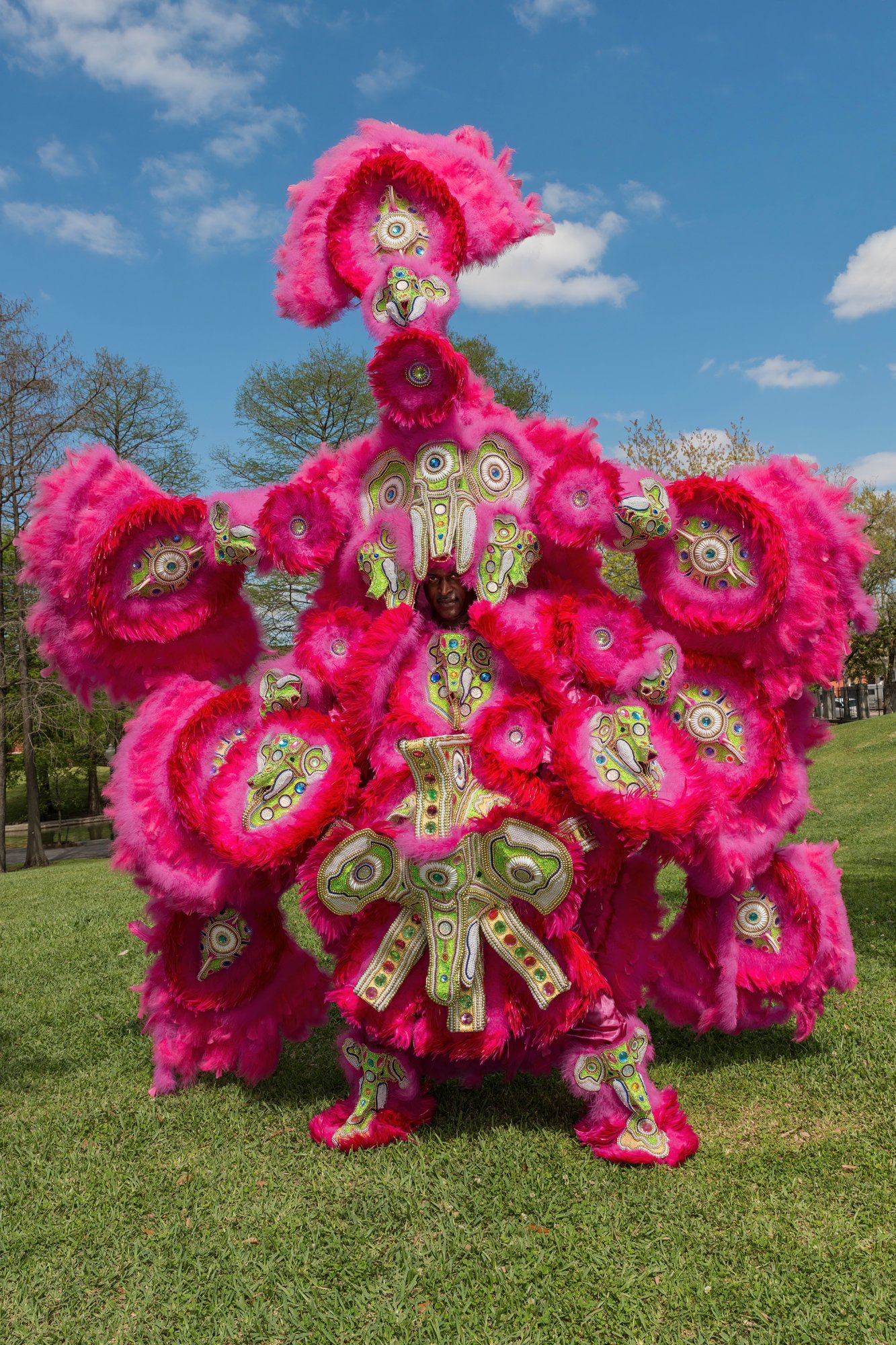Shaka Zulu: Big Chief of the Golden Feather Hunter Nation, NEA Fellowship Awardee, and The Ella Project Client
By Veronica Cross
Big Chief Shaka Zulu of the Golden Feather Hunter nation is a New Orleans Black Masking Indian Craftsman, stilt dancer, musician, entrepreneur, and most recently – a 2022 National Endowment for the Arts (NEA) National Heritage Fellow. Throughout his life, Zulu has successfully merged artist, culture bearer, and production roles, prioritizing African diasporic traditions. As an Ella Project client, he has participated in music industry workshops and received legal counsel to protect his intellectual property.
Big Chief Shaka Zulu was born in the Ninth Ward neighborhood of New Orleans in 1969. Zulu recounts that participation in the cultural arts was both standard and sustainable, with an emphasis on the African trinity of music, song and dance from the culture that came out of Congo Square. By the age of four, Zulu was learning to play on the drum that his father carved for him; at the age of thirteen, he was initiated into adulthood and his community’s drum society by way of traditional African Rites of Passage, on a drum he helped to carve. Zulu’s father, Zohar Israel, established a performing arts company called Free Spirit that produced African drum and dance programming for school assemblies and community gatherings. As an entrepreneur with the dual purpose to share culture and remain financially independent, Israel’s mantra of “make a life, not a living” was a message that Zulu would also manifest. In 1996, Zulu contributed drum tracks to the album Feathercraft, organized by Chief Smiley Ricks and big chiefs from various nations as the Indians of the Nation band. This experience would become Zulu’s inroad to joining a Black Masking Indian nation.
Black Masking Indians’ creativity is exemplified in their elaborate narrative suits that traditionally take one year to make and are debuted on Carnival Day. Through the employment of ornate beadwork, feathers, rhinestones, and other design embellishments, each suit tells a story germane to its maker and reflective of African descendants and Indigenous peoples’ resistance against oppressions ranging from slavery, genocide, and racism, to being banned from Carnival traditions in 19th and 20th century New Orleans. In 1999, Shaka Zulu joined his first Black Masking Indian nation, the famed Yellow Pocahontas lead by Big Chief Allison “Tootie” Montana (himself a 1987 NEA National Heritage Fellow), which was transitioning leadership to his son Darryl Montana. A major cultural and legal shift establishing the Black Masking Indians’ suits as intellectual property had already been developing and certain members of the Yellow Pocahontas nation were accessing legal services from attorney Ashlye Keaton (who co-founded The Ella Project) to protect their work. This meant that these makers had legal rights and therefore greater control related to how photographs (or any reproductions thereof) of their suits were distributed. For example, a Black Masking Indian could demand a royalty fee from sales of or could control distribution of photographs of their suits or the countless ads that depicted Black Masking Indians toward New Orleans tourism or cultural events. Keaton established that the suits were three-dimensional sculptures and not functional as clothing or costumes, which would not fall under copyright protection.
As Big Chief Shaka Zulu acknowledges the transformative experience of debuting his suit on Carnival Day, likewise the recognition of Black Masking Indian craft as individualistic art has also transformed personal and public perceptions. Zulu cites the sense of “ownership, power, preservation” that the copyright ruling established for him. That shift is also seen in institutional and commercial terms as contemporary museum shows and gallery representation expand conversations on the ethnographic and historical to include the personal and present.
Zulu has exhibited his suits internationally as far away as Russia and his suits were purchased for permanent collections in Berlin and the Netherlands. In 2015, Zulu joined the Mardi Gras Indian (an earlier, alternate name for Black Masking Indians) Cooperative at Jazz Fest to sell the ornately beaded elements of their suits, presented in frames. Offering the elements to the public for sale along with a certificate of authenticity was both entrepreneurial for the makers and established creative and monetary value for their art, following Zohar Israel’s directive to “…use culture to make money from”. Currently, the Angela King Gallery in New Orleans represents Big Chief Shaka Zulu’s suits and their embellished elements, or “patches”. In 2022, Zulu’s work was included in the museum exhibition Mystery in Motion: African American Spirituality in Mardi Gras, curated by scholar Kim Vaz-Deville and artist-educator Ron Bechet at The Presbyteré at the Louisiana State Museum in New Orleans, an exhibition that later traveled to the Museé du quai Branly in Paris, France.
The experience of copyrighting Indian suits has also informed how Big Chief Shaka Zulu’s approaches music publishing and he has attended The Ella Project’s Crescendo music industry seminars. Zulu also owns a production company inspired by his father, Zulu Connection, with his wife Na’iama Zulu. The couple collaborates on their 33-member cast live theater production New Orleans Voices of Congo Square, a venture that The Ella Project also counseled around protecting through copyright. This touring production explores Black Carnival traditions and honors African diasporic and Indigenous peoples. A special component of this show is the Caribbean stilt dancing custom mokojumbe, “the dance of the high spirits”, which has been handed down as a family tradition. You may have seen Zulu and his daughter Sarauniya Zulu stilt dancing in this production or at other New Orleans cultural events such as Tremé Fall Festival.
Big Chief Shaka Zulu was nominated for the NEA National Heritage Fellowship by Queen Nur, an award-winning storyteller, teaching artist and folklorist based in New Jersey. This fellowship is the highest-ranking distinction for master folk and traditional artists in America, and the NEA awarded it to Zulu from a pool of ten nominees. To learn more about Big Chief Shaka Zulu, we invite you to view the NEA documentary that was debuted on November 17, 2022 here: https://youtu.be/4cFjyNzL1no You can also look out for Big Chief Shaka Zulu and the Golden Feather Hunter Nation on Carnival Day.



